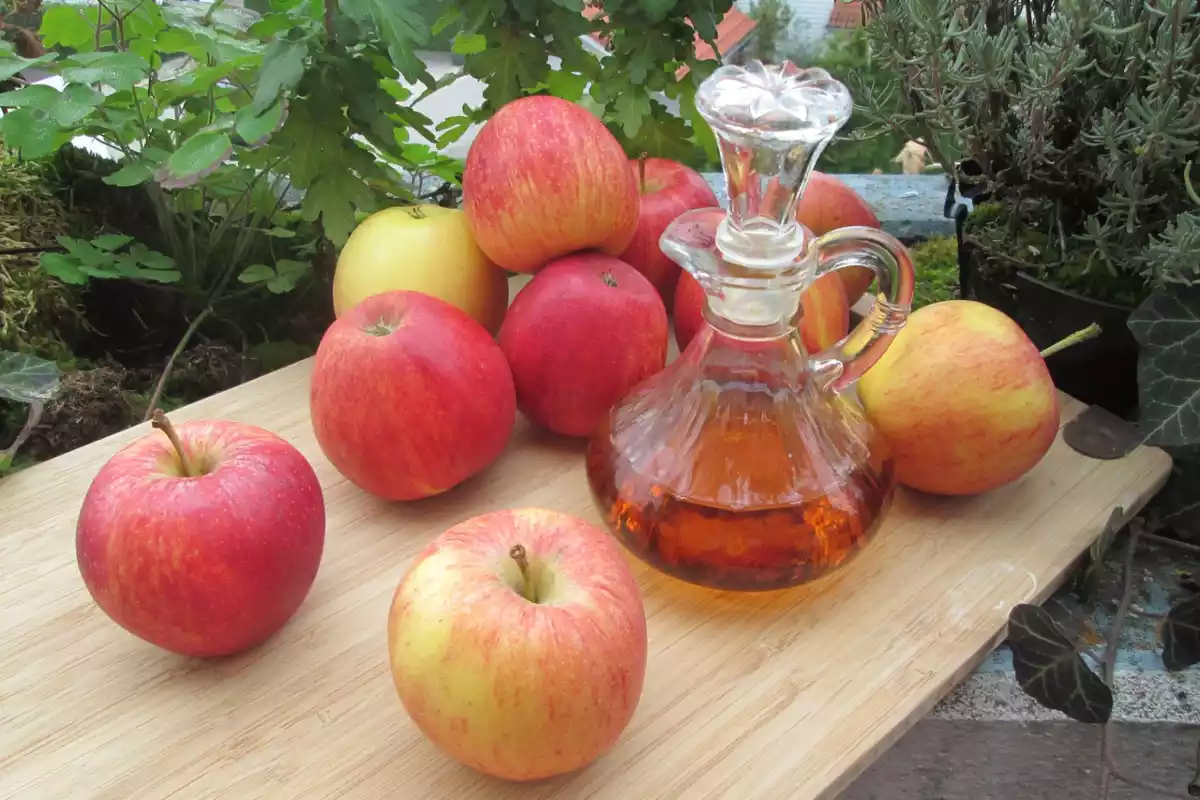Apple cider vinegar is one of the most popular types of condiments consumed nowadays. It is used to flavor various dishes, and according to scientific studies, it is considered to have a series of health benefits. Cider vinegar is also an old folk remedy and has been used for various domestic and medicinal purposes for centuries. In this article, we will go over how apple cider vinegar is made, what its possible properties are, what it is used for and what quantity doctors recommend for consumption.
What is apple cider vinegar?
Apple cider vinegar is made from freshly crushed ripe apples which are then fermented and subjected to several processes before reaching the final product. During the first step, the crushed apples are exposed to yeast to start the fermentation process, and so sugars are converted to alcohol. During the second stage, bacteria are added to the alcohol solution, which causes the alcohol to ferment even more and become acetic acid.
Health benefits and properties
Apple cider vinegar is associated with a few health benefits that people may or may not be aware of. Although scientists need to conduct more studies on the real health benefits of apple cider vinegar, some of the theories that carry more weight are the following:
1. Reduces acid reflux
Acid reflux or gastroesophageal reflux disease (GERD) is a condition that occurs when there is a return of the food consumed, from the stomach to the esophagus, which causes symptoms such as nausea and heartburn. Studies have shown that people with this disease show a 75% reduction in symptoms when ingesting apple cider vinegar and one hour of delayed reflux compared to those taking antacids. So consuming a spoonful of apple cider vinegar can alleviate the symptoms of heartburn or the symptoms of gastroesophageal reflux disease.
2. Kills bacteria
It has been shown that vinegar can help kill pathogens, including bacteria. Traditionally it has been used to clean and disinfect, treat nail fungus, lice, warts, and ear infections. Moreover, this product has also been used since ancient times as a food preservative, and studies have shown that it inhibits the growth of bacteria (such as E. coli) in food.
3. Reduces blood sugar
Other properties associated with apple cider vinegar is that it lowers blood sugar levels. Studies have shown that it can improve the function of insulin and decrease blood sugar levels after meals. For this reason, it may be useful for people with diabetes, prediabetes or those who want to keep their blood sugar levels low for other purposes.

4. Increases satiety
Several studies have shown that vinegar can increase satiety, helping us to eat fewer calories and, consequently, lose weight. For example, if we take vinegar together with a meal rich in carbohydrates, it increases our feeling of satiety, and we end up consuming between 200 and 275 fewer calories during the rest of the day.
A study of 175 people with obesity showed that daily consumption of apple cider vinegar reduced abdominal fat and increased weight loss between 1.2 kg and 1.7 kg. However, it must be taken into account that this study was conducted for 3 months, so the actual effects on body weight seem to be rather modest.
5. Reduces cholesterol and promotes heart health
According to a Harvard University study, it was shown that women who ate salad dressings with vinegar were less likely to develop heart disease. Also, it is believed that acetic acid, along with chlorogenic acid, present in apple cider vinegar can be useful in reducing levels of LDL (bad) cholesterol and increasing levels of HDL (good) cholesterol, thus protecting the cardiovascular system. However, no studies have yet been conducted in humans that can demonstrate this fact and this property is only based on laboratory experiments.
6. Reduces acne
Another feature associated with apple cider vinegar is that it can help balance the pH levels of the skin thanks to its moderate alkaline levels. The pH level of the vinegar is similar to the pH level of the protective skin acid layer. Applying a solution of this product topically can help us restore the shine of the skin, reduce pore dilation, prevent the skin from becoming too oily or too dry by balancing the production of sebum and improving the circulation of nutrients.
To apply apple cider vinegar to the skin, mix a spoonful of this liquid with two tablespoons of water. Dampen a cotton cloth and clean your face with the solution. Apple cider vinegar is a combination of lactic acid, citric acid, acetic acid, and succinic acid, which have the potential to reduce the growth of the bacteria responsible for acne. In addition, it has also been shown that its use on acne scars helps improve the texture, pigmentation, and appearance of the skin.
How much apple cider vinegar should we drink?
The best way to incorporate apple cider vinegar into our diet is to use it as a dressing for salads, in homemade mayonnaise and other similar dishes. Some people also like to dilute it in water and drink it. Typical doses vary from 1 to 2 teaspoons (5 to 10 ml) to 1 to 2 tablespoons (15 to 30 ml) per day, mixed in a large glass of water. Apple cider vinegar can be used with a variety of purposes in mind.
For example, we can:
- take it diluted with water to help with bowel movement
- treat acid reflux
- alleviate heartburn symptoms
- tonic for the skin
- control oily skin
- reduce facial acne
- treat acne scars
Apple cider vinegar is also commonly used in salad dressings and to soften meat. We can also sprinkle it on cooked vegetables to flavor them. It has also always been used as a cleaning product for the house. We can dilute the vinegar with water and use it as a natural cleaning or odor neutralizer spray in the home.
Apple cider vinegar also relieves sunburn - add a spoonful of this product in the bathtub to reduce the burning sensation. It is also used to treat warts - soak a cotton cloth with vinegar and apply it directly on the wart. Then cover it with a band-aid and repeat this process a few times until the wart falls off on its own. Finally, we can use it to cure rashes caused by nettles or other types of plants. Thanks to the potassium that vinegar has, it helps to calm inflammation and reduce itching.
Check out the original article: Vinagre de manzana: para qué sirve, usos y propiedades at viviendolasalud.com
References:
Budak, N. H., Aykin, E., Seydim, A. C., Greene, A. K., & Guzel‐Seydim, Z. B. (2014). Functional properties of vinegar. Journal of food science, 79(5), R757-R764.
Shishehbor, F., Mansoori, A., Sarkaki, A. R., Jalali, M. T., & Latifi, S. M. (2008). Apple cider vinegar attenuates lipid profile in normal and diabetic rats. Pakistan Journal of Biological Sciences, 11(23), 2634.

